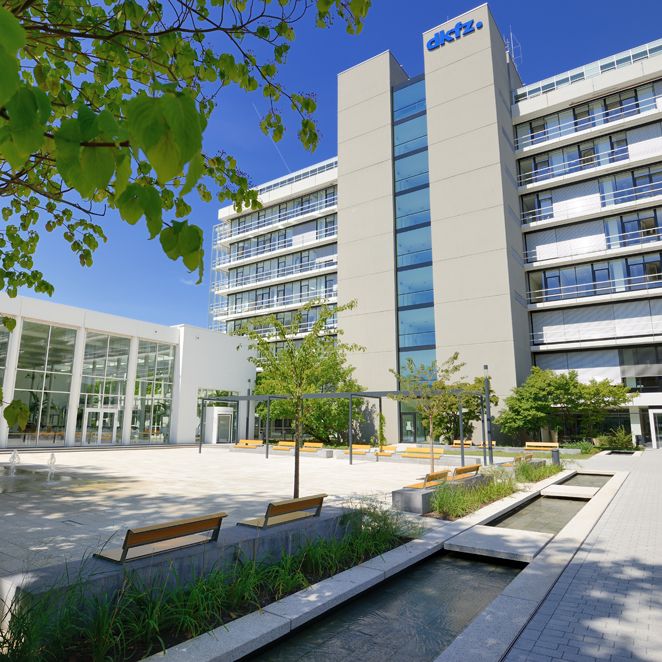Spitzenforschung gegen Krebs: Das DKFZ vereint exzellente Forschung mit modernster Technologie, um neue Erkenntnisse in die klinische Praxis zu bringen. Mit Data Science und KI entwickelt es innovative Ansätze, um Krebserkrankungen gezielt zu bekämpfen.
Mit HIDAs Mobilitätsprogrammen können Data-Science-Talente beim DKFZ an zukunftsweisenden Forschungsprojekten zu Krebserkrankungen mitwirken. Das Ziel: wissenschaftliche Erkenntnisse rasch in die klinische Praxis zu übertragen und die Gesellschaft fundiert über Krebsrisiken und Präventionsmöglichkeiten zu informieren.
Jetzt bewerben!

Die Programme
Mit HIDA das DKFZ kennen lernen
Das Deutsche Krebsforschungszentrum ist Teil der Helmholtz Gemeinschaft.
Mit folgenden Programmen können Data Science Talente am Zentrum forschen.
Das Deutsche Krebsforschungszentrum (DKFZ) ist die führende biomedizinische Forschungseinrichtung in Deutschland und ein Vorreiter in der Nutzung von Data Science und Künstlicher Intelligenz (KI) zur Krebsforschung. Mit modernster Technologie erforschen sie die Entstehung von Krebs, entwickeln personalisierte Therapien und suchen nach neuen Wirkstoffen.
Forschungsschwerpunkte:
- Zell- und Tumorbiologie
- Funktionelle und strukturelle Genomforschung
- Krebsrisikofaktoren und Prävention
- Immunologie, Infektion und Krebs
- Bildgebung und Radioonkologie
- Entwicklung neuer Krebstherapien
- Digitalisierung und Datenwissenschaft in der Krebsforschung

Die Standorte
Die Standorte
Die Standorte des DKFZ:
- Heidelberg (Hauptstandort)
- Nationales Centrum für Tumorerkrankungen (NCT) Heidelberg
- Nationales Centrum für Tumorerkrankungen (NCT) Dresden
- Deutsches Konsortium für Translationale Krebsforschung (DKTK) mit Partnerstandorten in:
- Berlin
- Dresden
- Essen/Düsseldorf
- Frankfurt/Mainz
- Freiburg
- München
- Tübingen
Kompetenzen des DKFZ im Bereich Data Science und KI
Das DKFZ verfügt über eine herausragende Expertise in der datengetriebenen Krebsforschung und nutzt modernste KI-Technologien zur Analyse komplexer biologischer Systeme. Seine interdisziplinären Teams aus Biologen, Medizinern und Data Scientists arbeiten eng zusammen, um neue Ansätze für personalisierte Medizin zu entwickeln.
Durch den Einsatz leistungsfähiger KI-Modelle und Big-Data-Analysen gewinnen sie tiefere Einblicke in die molekularen Mechanismen von Krebs und schaffen innovative Lösungen zur Unterstützung klinischer Entscheidungsprozesse.
- KI-gestützte Analyse von Histopathologiebildern
- Automatisierte Mustererkennung in molekularen und klinischen Daten
- Deep Learning für personalisierte Therapieempfehlungen
- Entwicklung und Anwendung von Simulationsmodellen für Tumorprogression
- Multimodale Datenintegration zur Verbesserung der Krebsfrüherkennung
Das DKFZ erforscht mit über 3.300 Mitarbeitenden, wie Krebs entsteht, diagnostiziert, behandelt und verhindert werden kann. In mehr als 90 Abteilungen entwickeln Forschende gezielte Wirkstoffe und personalisierte Therapien.
Bewerbungshinweise
Hinweise zur Bewerbung
Helmholtz-Betreuer
Lernen Sie hier einige potentielle Gastgeberinnen und Gastgeber an verschiedenen Helmholtz-Zentren kennen und erfahren sie mehr über deren jeweilige Data Science-Forschung durch einen Klick auf die Karten.
Bitte beachten Sie: Kontaktieren Sie Ihren potenziellen Betreuer oder Ihre potenzielle Betreuerin bitte vorab per E-Mail, um ein Forschungsprojekt vorzuschlagen und zu besprechen. Reichen Sie erst nach dieser Klärung Ihre Bewerbung ein.
Wenn Sie Fragen haben, senden Sie bitte eine E-Mail an: hida@helmholtz.de
Sie möchten selbst gerne Helmholtz-Gastgeber werden und suchen nach Unterstützung für Ihr Forschungsprojekt? Dann wenden Sie sich ebenfalls an die oben genannte E-Mail Adresse.
Die Hosts am DKFZ
Lernen Sie hier einige Gastgeberinnen und Gastgeber am DKFZ kennen und erfahren sie mehr über deren jeweilige Data Science-basierte Forschung.
Bevor Sie Kontakt mit den potenziellen Gastgebern aufnehmen, lesen Sie bitte die Hinweise zur Bewerbung.
Bitte beachten Sie: Die hier aufgeführte Liste zeigt lediglich eine Auswahl möglicher Gastgeber.
Darüber hinaus können Sie auch eigenständig potenzielle Hosts im Zentrum kontaktieren und mit ihnen eine Teilnahme am HIDA Mobility Program vereinbaren.

Klaus Maier-Hein
Medical Image Computing
Ansprechpartner

Short summary of your group's research: The Division of Medical Image Computing (MIC) pioneers research in machine learning and information processing in the context of image data analytics. We pursue cutting-edge developments at the core of computer science, with applications in but also beyond medicine. We are particularly interested in techniques for semantic segmentation and object detection as well as in unsupervised learning and probabilistic modelling.
What infrastructure, programs and tools are used in your group?
- Python Software Framework / Pytorch / Phabricator
- A GPU cluster at DKFZ tailored to specific needs, ranging from nodes with RTX 2080ti all the way up to Nvidia’s DGX systems
- The DKFZ has an Openstack cluster in which you can instantiate virtual machines for CPU heavy workloads.
What could a participant of the HIDA Trainee Network learn in your group? How could he or she support you in your group? At MIC we pursue cutting-edge developments at the core of computer science, with applications in but also beyond medicine. We believe a sophisticated research software system and infrastructure are key for methodological excellence, for example to facilitate highly scalable data analysis in a federated setting. In cooperation with numerous (clinical) partners, we work on the direct translation of the latest machine learning advances into relevant clinical applications. Depending on the specific interests of the participant of the HIDA training exchange many interesting and challenging aspects could be addressed. Please find a list of ongoing research project in the department on our website in the "research" section.

Stella Autenrieth
Dendritic Cells in Infection & Cancer
Ansprechpartner

Short summary of your group's research: Our research group is interested in elucidating the role of different DC subpopulations, their development and basic function in immune activation by bacterial infections, inflammation, and cancer to improve the basic understanding of DC function in disease but also the potential of DCs as targets for therapeutic intervention. Another focus of our research group is the phenotyping of immune cells using spectral flow cytometry. This allows the detailed characterization of all immune cells in the blood and tissues of patients before and during therapy with the goal of identifying cell populations or biomarkers that can predict therapy response.
What infrastructure, programs and tools are used in your group? The main techniques are spectral flow cytometry and scRNA sequencing. With spectral flow cytometry about 40 proteins that are expressed on or in cells can currently be determined simultaneously at the single cell level. We use tools like OMIQ for flow cytometry data and R for scRNA data analysis.
What could a participant of the HIDA Trainee Network learn in your group? How could he or she support you in your group? We offer insights into single cell analysis of immune cells especially how bacterial infections modulate the dendritic cell development. We hope to get support regarding the molecular mechanisms responsible for the infection-induced impaired dendritic cell development by analyzing our scRNA seq & spectral flow cytometry data.

Oliver Jäkel
Physics in Radiation Oncology
Ansprechpartner

Short summary of your group's research: The division of medical physics in radiation oncology at DKFZ comprises multiple research groups, which cover all steps of the radiation treatment chain. We apply machine learning for improving innovative radiotherapy techniques using photons and ion beams. This includes technical developments, improvement of patient-oriented workflows as well as treatment response analyses.
In particular, we focus on the following topics:
1. Image-based patient and motion modeling,
2. Mathematical Methods to optimize physical and biological treatment parameters and dose distributions,
3. Treatment Outcome Analysis & Prediction (Dosiomics & Radiomics),
4. Analysis of molecular and imaging data from preclinical biological studies.
What infrastructure, programs and tools are used in your group?
• Latest generation of radiotherapy treatment machines for image-guided radiotherapy (Ethos, MRLinac, particle therapy)
• Access to data from imaging modalities: MRI, CT, PET
• IT Hardware: Workstations & Servers for AI workflows, OpenStack Computing Cloud
• IT Software: Commercial and Open-Source Treatment Planning and Image Processing Software
• Various series of seminars, lectures and courses
• Close collaboration with data scientists, medical physicists, radiation oncologists, radiologists and biologists
What could a participant of the HIDA Trainee Network learn in your group? How could he or she support you in your group?
Participants of the HIDA Trainee Network will get
• Access to strong interdisciplinary and translational work
• Insights into the latest radiotherapy and imaging developments
• In touch with applications of machine learning to medical (radiotherapy and imaging) data
Candidates could support in data analysis, development of new AI methods and bringing new ideas by translating solutions from a different research field to medical physics.



